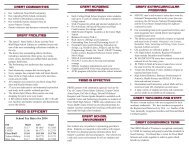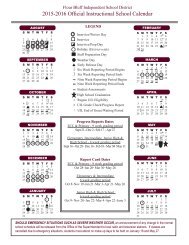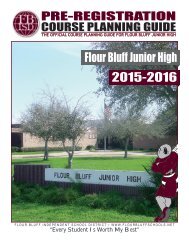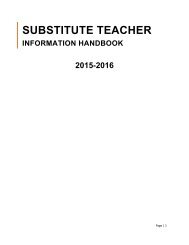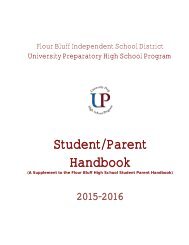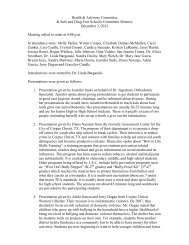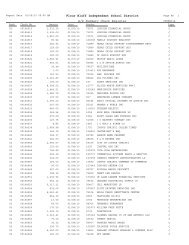Student/Parent Handbook
Campus Handbook - Flour Bluff Independent School District
Campus Handbook - Flour Bluff Independent School District
Create successful ePaper yourself
Turn your PDF publications into a flip-book with our unique Google optimized e-Paper software.
MEDICINE AT SCHOOL<br />
All medication must immediately be delivered to the school nurse upon arrival to the<br />
school. (Please see the <strong>Student</strong> Code of Conduct.) At no time shall a student have in<br />
his/her possession any form of medication (non-prescription, prescription, herbal<br />
substances or dietary supplements.) All medication should be brought to school by a<br />
parent/guardian and is to be kept in the nurse’s office. A medical release form/letter from<br />
the parent/guardian giving a written request to administer the proper information must be<br />
signed by the parent/guardian giving authorized school personnel directions for its<br />
administration. The request must include the student’s name, date, name of drug, time<br />
and dosage required and must be signed by the parent/guardian.<br />
The administration of any medication containing a narcotic is discouraged during school<br />
hours. If a student requires medication for this type of pain, it is recommended that<br />
he/she remain home until a milder form of medication is indicated. It is highly<br />
recommended that parents do not administer narcotics before school due to safety<br />
issues at school.<br />
District employees will not give a student prescription medication, nonprescription<br />
medication, herbal substances, anabolic steroids, or dietary supplements, with the<br />
following exceptions:<br />
Only authorized employees, in accordance with policies at FFAC, may administer:<br />
• Prescription medication, in the original, properly labeled container, provided by the<br />
parent, along with a written request. The prescription must be current and not<br />
outdated.<br />
• Prescription medication from a properly labeled unit dosage container filled by a<br />
registered nurse or another qualified District employee from the original, properly<br />
labeled container. The prescription must be current and not outdated.<br />
• Nonprescription medication, in the original, properly labeled container, provided by<br />
the parent along with a written request. The medication must be current and not<br />
be expired.<br />
• Herbal or dietary supplements provided by the parent only if required by the<br />
student’s individualized education program (IEP) or Section 504 plan for a student<br />
with disabilities. The supplement must be current and not expired.<br />
• The district will maintain and administer to a student nonprescription medication<br />
for emergency situations, but only:<br />
• In accordance with the guidelines developed with an approved, licensed medical<br />
advisor, and<br />
o When the parent has previously provided written consent to emergency<br />
treatment on the district’s form. The district and campuses do not maintain a<br />
regular supply of non-prescription medication. <strong>Parent</strong>s are expected to supply<br />
the appropriate medication for their child.<br />
A student with asthma or severe allergic reaction (anaphylaxis) may be permitted to<br />
possess and use prescribed asthma or anaphylaxis medication at school or schoolrelated<br />
events only if he or she has written authorization from his or her parent and<br />
a physician or other licensed health-care provider. The authorization must be on file<br />
with the school nurse. The student must also demonstrate to his or her physician or<br />
31



